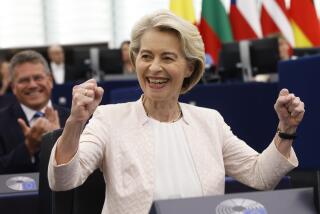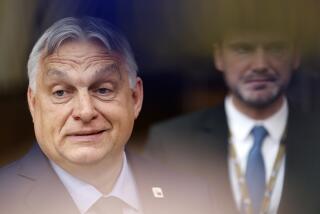Reagan Visit to Boost Image of Mostly Powerless European Parliament
- Share via
STRASBOURG, France — At 11:30 p.m. on a recent Thursday, while this provincial town on the Franco-German frontier was closing its doors for the night, the European Parliament was still in session on the outskirts of town.
There was nothing unusual about this midnight meeting, which Strasbourgers and members of the Parliament jokingly call the “Late Show.” Indeed, ever since 1979, when its first members were elected by the voters of nine countries, the European Parliament has been toiling away--often late into the night--to erase its image as a powerless, unimportant body.
For this reason, President Reagan’s well publicized visit to Strasbourg on Wednesday to address the Parliament is seen here as an important victory in the continuing struggle for recognition.
In fact, Reagan, the first American president to address the European Parliament, is known to view the institution, with its 434 members representing 270 million people in 10 countries, as the ideal forum for a major speech on U.S.-European relations.
Limited Powers
Pierre Pflimlin, 78, a former premier of France and former mayor of Strasbourg who is president of the Parliament, said in a recent interview: “Everyone knows we don’t have much power, but they still accept us as an important institution. President Reagan’s visit is a symbolic recognition of this importance and our potential.”
The Parliament has only two constitutional powers. It can reject non-obligatory portions of the European Community budget and it can dismiss the European Commission in Brussels, the legislative arm of the community, by a vote of censure.
It has used its budgetary veto power only twice in six years, usually to force spending compromises with the Council of Ministers, the executive arm of the European Community. It has never dismissed the commission.
The European Parliament, which has its roots in the rubble of World War II, takes its shape from the original assemblies of the European Coal and Steel Community, which were created in 1951, and the European Economic Community and European Atomic Energy Community, both created in 1957.
Those assemblies, whose members were elected by the national parliaments of the member states, held their first meetings in a Strasbourg severely damaged by the war.
Today, the European Parliament meets for its monthly general sessions in the Palace of Europe, a futuristic, fortress-like building overlooking the gently winding Ill River. The members, elected by universal suffrage to five-year terms, represent Belgium, Denmark, England, France, Greece, Holland, Luxembourg, Ireland, Italy and West Germany.
Fifty-four different national political parties are represented in the Parliament, divided into eight broad political groupings. The center-right groups, excluding the extremist French National Front, are presently in the majority with a margin of four votes.
For idealists, the European Parliament is the supreme symbol of democratic Europe and a foundation upon which to build a future European political union. It is not enough, these idealists say, for Europe to have its Common Market.
‘Contrary to the Genius’
Otto von Habsburg, a West German member of Parliament from the right-of-center Christian Democratic Union, said: “Developing a European Community with a purely economic focus would be contrary to the genius of the continent. Thus the mission of the Parliament is to give a political dimension to the economic community.”
For critics of Parliament, and there are many, it is a waste of time and money. Among these is Leslie Huckfield, a member elected by the British Labor Party.
“I wouldn’t call this a parliament,” he said. “It’s powerless. We only use it as a platform to put our policies forward. It’s more like a theater than a political assembly. It’s far less powerful than your state assembly in Sacramento. I don’t want to see its power increased because that will only diminish our national sovereignty.”
The Parliament has offices in Belgium, Luxembourg and France, and is often called the “Gypsy” or “Vagrant” Parliament. Its secretariat is located in Luxembourg. It holds plenary sessions in Strasbourg and committee meetings in Brussels, an arrangement dating back to the founding of the Common Market.
The Parliament has seven official languages, and is a growth-industry for translators and interpreters. A substantial portion of the Parliament’s 1985 budget of $170 million will be spent for translation--mountains of documents are turned out every day.
Next January, when Spain and Portugal join the European Community and send 84 representatives to the Parliament, Spanish and Portugese will be added to the assembly’s official list of languages, which now includes English, Danish, Dutch, French, German, Greek and Italian.
With membership in the Parliament increasing to 518, the meeting hall will have to be altered to accommodate the new members. At a cost of $1.6 million, slightly more than seven inches will be shaved from each of the existing seats to make room for more.
Its geographic and language troubles are bothersome, but the Parliament’s main difficulty at present is public opinion.
In the words of Pieter Dankert, the Dutch Socialist who was president of the Parliament from 1982 to 1984, “We have enormous problems in our relations with the electorate. The Parliament’s development of political power is directly related to popular support, and we don’t have it right now.”
Nonetheless, according to Eurobarometer, the official polling organization of the European Community, in the six years from 1977 to 1983 the percentage of people who thought that Parliament played an “important or very important” role in Europe increased from 37 to 51.
Still, leaders and members worry that the Parliament will never win the public’s favor as long as it continues to concentrate on out-of-area issues and policy minutiae.
In a single week in April, the Parliament debated the problem of dumping raspberries and strawberries on the Common Market. It considered ways to reduce noise made by trains. It adopted resolutions encouraging the British and French to press ahead with plans for a tunnel under the English Channel, condemning killings in Chile and calling on the Turkish government to stop imposing the death sentence on Kurdish soldiers.
More to Read
Sign up for Essential California
The most important California stories and recommendations in your inbox every morning.
You may occasionally receive promotional content from the Los Angeles Times.










